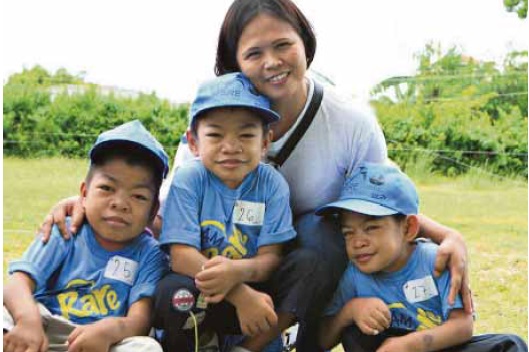MANILA, Philippines–They stand no more than three feet and look remarkably alike—same coarse facial features, short neck and fisted hands.
It is easy to assume they are just young, mature-looking triplets. But they’re not.
John Paul and Peter John Parco, who are twins, are 16, while their brother Vicente Jr. is a year younger. The three suffer from Hunter syndrome, a rare and serious genetic disorder that strikes when an enzyme the body needs is missing or is not working properly. The disease primarily affects males.
Apart from changes in facial and anatomical features and stunted growth, people with Hunter syndrome suffer from mental retardation, progressive hearing loss and thickening of the heart valves leading to a decline in cardiac function, obstructive airway disease and enlargement of the liver and spleen.
Improve quality of life
“Just like other Filipinos suffering from a rare disease, the siblings need continuous access to therapies that could improve their quality of life. At the moment this is next to impossible given the fact that little is known about rare diseases. There are very few specific treatments available and when there are, they are very expensive and thus out of reach of the majority of patients,” said Cynthia Magdaraog, president of the Philippine Society for Orphan Disorders (PSOD), a nonprofit organization founded in 2006.
Magdaraog explained that a disease or disorder is considered rare if it affects one in 20,000 individuals, as defined by the Institute of Human Genetics of the National Institutes of Health, University of the Philippines Manila.
In the case of Hunter syndrome, around 2,000 people worldwide have been known to have this disease, with about 20 recorded in the Philippines.
On Feb. 28, the world marked the Rare Disease Day, an annual observance that started in 2007 to raise awareness of rare diseases, increase international cooperation in the field of clinical and scientific research, and share scientific knowledge on all rare diseases.
Rare Disease Act
In the Philippines, families and doctors of patients with rare disease are hoping for the passage of the “Rare Disease Act of 2014,” which calls on the government to make sure that persons with rare diseases will be given access to medical treatment and drugs.
Hunter syndrome is just one of the more than 7,000 different types of rare diseases.
Unfortunately, its cure has yet to be discovered and current treatments available are just meant to slow the disease’s progress and to lessen its
severity.
“Just because a disease is rare doesn’t mean it should be disregarded. Patients often lack access to effective medical care and information, leaving them feeling isolated and misinformed. Our organization has and will continue to work hard to address this,” Magdaraog said.
According to Magdaraog, who has a 33-year-old son suffering from a neuromuscular disorder called Pompe disease, PSOD has been relentlessly sourcing funds from foreign and local donors.
The group has arranged with drug companies to make available special food formulas, medication and enzyme replacement therapies crucial to sustaining and improving the health of patients with a rare disease.
Realizing that this was not a sustainable solution, Magdaraog sought the help of several lawmakers a few years ago.
“I know from experience the challenges they face, because I cared for and lost my youngest son due to complications from a rare congenital disease called trisomy 13,” said Sen. Pia Cayetano in a privilege speech on Feb. 25. Trisomy 13 is a chromosomal disorder that causes developmental delay.
Cayetano, who chairs the Senate committee on women, family relations and gender equality, said the Parco brothers are currently taking a maintenance drug, and they are living fairly normal lives. The twins are now in fourth-year high school, while Vicente is in his third year.
“Other children affected with rare diseases do not share the same situation as the Parco brothers, who have been fortunate enough to receive help and support to sustain the maintenance drugs they need,” said Cayetano, who raised the need to fund healthcare and assistance for rare-disease patients during a recent budget deliberation for the Department of Health (DOH), proposing that P100 million be taken from the proceeds of the sin tax for this purpose.
Cayetano said the committee report for the rare disease bill was being finalized and would be filed soon.
The bill, once signed into law, will not only allocate a portion of Republic Act No. 10351 or the Sin Tax Reform Act to health services for patients with rare diseases but will also designate the DOH to establish a National Rare Disease Registry, which will include an inventory of rare diseases in the country, information on diagnosed patients, and a list of certified medicines and medical devices.
